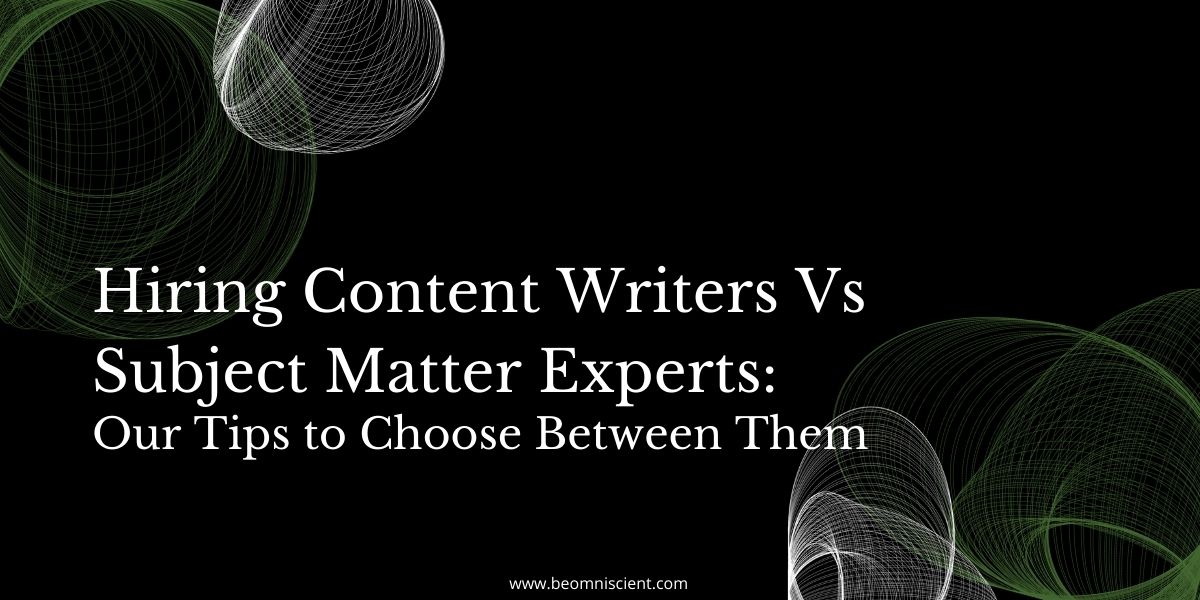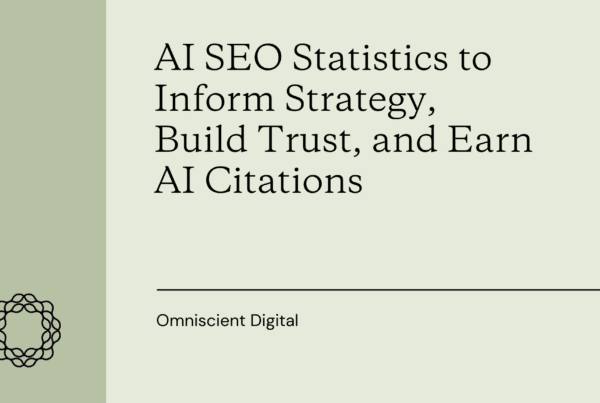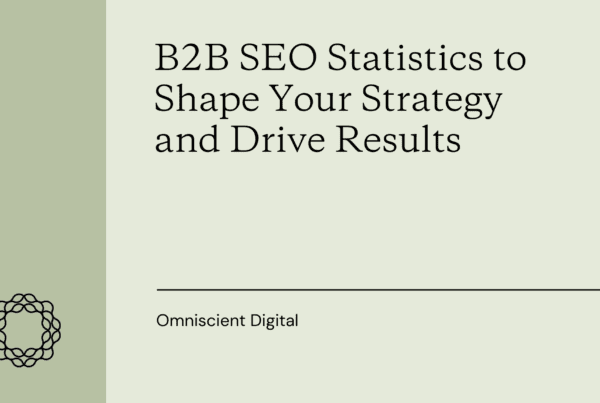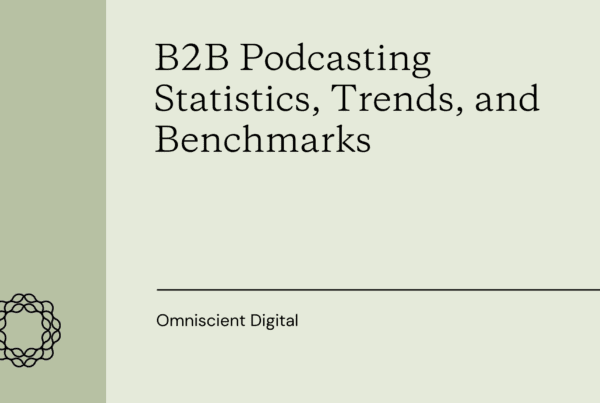
Subject matter experts (SMEs) offer a valuable perspective and dose of credibility to any content marketing program.
They are individuals of any imaginable occupation who are deeply ingrained in the day-to-day practice of their specific area of expertise.
A SME is someone who gets their proverbial hands dirty.
For example, a SME might be a marketer who runs AB tests all day long. In contrast, a writer is someone who communicates what the SME does to the world – such as writing a blog post about how AB tests work.
On the rare occasion you can find a SME who also happens to be an excellent writer, it’s the equivalent of hitting the content jackpot.
Other times, you have to figure out different ways to leverage the expertise of busy SMEs.
So when will a regular writer suffice, and when do you need an expert? Let’s find out!
Hire writers for TOFU content
If you’re working on broad, top of the funnel content, a regular writer should do the trick.
I find that individuals who are strong yet generic writers are the best candidates for work that answers broad questions. SMEs are better suited to highly specific and contextual BOFU content.
TOFU content typical answers questions like:
- What is X?
- Why is X important?
- How do you do X?
This type of content is generally easy to research and pull from the existing discussion of the topic at hand. There’s already existing content on the topic floating out there in the world.
A good writer can pull those threads together to craft a narrative that makes sense for your business.
Hire writers for SEO-driven content
If you’re planning out content that relies heavily on SEO-driven features, a writer will again be your best bet to put the content together.
SMEs have a wealth of knowledge – but they aren’t always wired to think about things like SEO. Their writing might not fit into the perfect mold of a keyword.
Secondly, when you get your hands on a true SME, you don’t want to waste their time on general content or time-consuming SEO specifics when their talent can be put to better use.
You want your SMEs to tackle the hard stuff: the things that you can’t do yourself. You want to put them to work on content that only their unique expertise can take to the next level.
Pick their brain and ask them to contribute content ideas of their own.
In this way, SME content can require more long-term thinking. Often, their insights are better suited to social media distribution than a standard blog post.
Get creative and think about how your SME’s insight could be put to work on social, Quora, Reddit, YouTube, and more.
SMEs have lots of thoughts, but little time
SMEs are often so caught up in their jobs that they can’t share knowledge. That makes it extra helpful when a savvy writer can pick their brain.
“I’ve realized that some of the best SMEs have a lot of opinions and thoughts. And they’re like, oh, I should make time to write this. Or, I should turn this into a presentation, or I want to do more speaking. But it’s just additional work for them,” said Omniscient co-founder David Ly Khim.
Sometimes, the solution is simple: have a writer extract quick sound bites of knowledge from an SME, and work that expertise into a piece of content.
While SME’s may not have time to sit down and write a book or take on a speaking gig, most of them do have a few minutes to answer a few targeted questions about their work.
Not only do some SMEs have time – many are often happy to do so. After all, it’s always flattering to have someone take an interest in your work. And the bonus is that they’ll be featured in a piece of content that will highlight their expertise and help accelerate their career.
When contacting SMEs, be specific
Because SMEs are so busy, you need to be extremely specific while approaching them with a request.
When I was at HubSpot, I quickly realized that I had to hone some good journalism skills, fast.
Why? Because I wanted to leverage the knowledge of internal and external SMEs.
I knew that sending them a standard content brief or an email full of open-ended questions would get me nowhere.
In the fast-paced world of HubSpot, even asking to schedule a quick phone call sometimes didn’t work.
This meant that I had to get really good at knowing exactly what I wanted to write ahead of time. Then, I needed to plan out the specific questions I wanted to ask.
If given the opportunity to jump on a live call, I had to know how to get right to the root of what I needed from the SME, because they didn’t have a lot of time.
In fact, this is an area where writers can think about delivering a ton of value. A writer who can hone the art of pulling knowledge out of SMEs and translating that knowledge to the wider world will go far.
Once you have helpful insight and soundbites from top-quality SMEs, the content possibilities are endless. You can turn them into blog posts, interview write-ups, podcasts, and more.
Don’t put constraints on SME knowledge
Just like you wouldn’t make a pro cyclist ride with training wheels, you don’t want to put too many guidelines or limitations on SMEs.
A SME’s best work and insights will be unleashed when you give them more freedom to work on content.
In a recent team conversation all about this topic, our co-founder Alex recalled that during his time at CXL, they tried to let SMEs share their knowledge without any constraints, filters, or guidelines.
“When we would work with guest writers at CXL, it’s like we didn’t give them any guidelines or content briefs. We just let it rip, you know. Because we didn’t want to filter it through any of our own lenses. We just wanted their pure expertise,” Alex said.
After the SME has mined that pure expertise, take that raw material and shape it into content that makes sense. You can do things like:
- Work in a target keyword
- Come up with a good title
- Strategiacally name the H2s
When you meddle too much in the process of what and how an SME can write, you risk undermining the value of that content. That’s why it’s worth staying a bit more hands-off with SME guest writers, and focusing on the editorial process instead.
Hire writers that think like journalists
Perhaps the most logical way to leverage skilled writers and SME insights is to seek out writers who think like journalists.
It’s extremely valuable to find writers who are skilled at outlining a piece of content and pulling quotes from SMEs to back it up.
That way, you can get the best of both worlds: strong writing and a unique and credible perspective.
While working at CXL, Alex used to do exactly this in order to come up with some of the team’s greatest content.
“I wanted to know more people in the industry. So I didn’t do it on a podcast and I didn’t record any of it, but I used to just go get lunch with people twice a week. And I felt like I built some pretty good friendships that way. And I would often pull away interesting ideas from those conversations, and then loop back out and reach back out to them when I would actually write those topics,” Alex said.
The bottom line is that you should think about how all of your relationships and interesting conversations can become a part of your content arsenal.
David agreed that a strong communicator who is comfortable working with SMEs can help your content program go far.
“I think someone who has really good communication, can do it in writing, is very curious, and maybe has a journalism background is worth a lot. Who can take really complex ideas and communicate well. And maybe it’s a prodigy fresh out of college, or maybe it’s someone who has been working for a couple of years and has worked with many SMEs. And that person is going to take a content program to the next level,” David said.
The key is knowing what questions to ask, to whom, and when. Then, the writer can reach out to those contacts and sprinkle in those expert quotes.
Let your audience guide you
In general, writers are a good fit for TOFU content and SMEs are valuable for more detailed BOFU content.
But this isn’t black and white – it depends on your audience and industry.
If you cater to a highly savvy or technical audience, then even your top-of-the-funnel content needs to read at an expert level.
David knows firsthand that generic content marketing won’t cut it when it comes to savvy audiences like engineers.
“When I was at Fishtown Analytics and we were thinking about content for DBT, which is for data engineering and data transformation, we had an agency working on that content. And the way they wrote was very content marketing. If you’re a data engineer, you can sniff that out immediately,” David said.
When your audience thinks the content smells like marketing, it’s a turnoff. It means that the content isn’t doing a good job of “reading the room” and isn’t providing real value.
A professional data engineer has no interest in an article with the headline “What is data transformation?” Neither will someone who is offering data engineering services look for content about “how data engineering works.”
They already know exactly what data transformation is. What they want is content centered on best practices, and insights into how other companies do data transformation.
“The top of the funnel, entry-level content is really easy to create, so it’s very saturated. So it might be a strategic decision to say – We know it’s not going to be high traffic, but we want to focus on SME-like middle and bottom of the funnel content, because we know that that makes us experts in that content,” David said.
Content Writers Vs SMEs – The Final Word
By aligning your content strategy with your audience needs and your brand goals, you can focus on content that provides value, reads as credible, and makes you truly shine.
Ready to start creating content? Get details of the best content writers in your inbox with our writer’s database. And if you’re looking to create a results-driven content strategy, set up a free strategy call with us.


